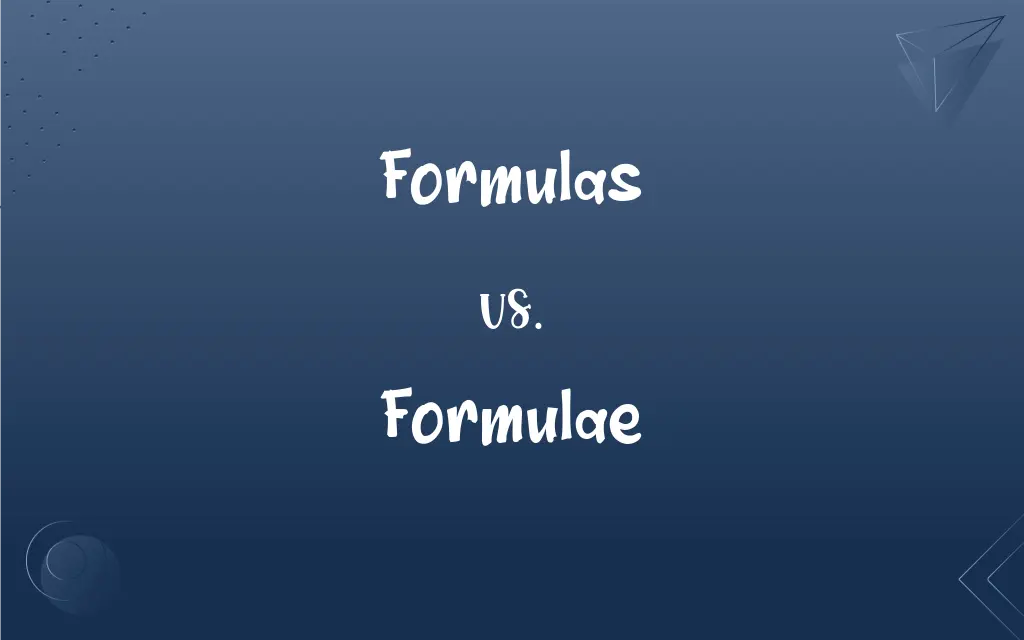Formulas vs. Formulae: What's the Difference?
Edited by Aimie Carlson || By Janet White || Published on March 3, 2024
"Formulas" and "formulae" are both plural forms of the word "formula," with "formulas" being more common in American English and "formulae" in British English.

Key Differences
"Formulas" is the plural form of "formula" predominantly used in American English. It refers to a set of instructions or fixed forms, often used in mathematical, scientific, or technical contexts. "Formulae," on the other hand, is the traditional Latin plural of "formula" and is more commonly used in British English, especially in academic or formal settings.
In everyday usage, particularly in the United States, "formulas" is the more familiar and widely accepted term. For example, one might refer to various chemical formulas in a science class. Conversely, "formulae" is often preferred in more formal or classical contexts, as seen in certain scientific disciplines in the UK.
The choice between "formulas" and "formulae" can also reflect the writer's preference or the stylistic guidelines of a particular field or publication. For instance, an American journal might standardize on "formulas," whereas a British publication might opt for "formulae."
In terms of meaning, there is no difference between "formulas" and "formulae." Both terms serve as plural forms of "formula," denoting a set of rules or principles, typically in a mathematical or scientific context.
Comparison Chart
Usage Region
Predominantly in American English
More common in British English
ADVERTISEMENT
Context
Used in everyday and academic contexts
Often found in formal or academic settings
Style Preference
Favored in American publications
Preferred in British and classical literature
Field
Widely accepted in various fields
Used particularly in scientific disciplines
Meaning
Plural of "formula," no difference in meaning
Plural of "formula," same as "formulas"
Formulas and Formulae Definitions
Formulas
Plural of formula, denoting a set of rules or principles.
The textbook contained various mathematical formulas.
ADVERTISEMENT
Formulae
Traditional Latin plural of formula, used in academic contexts.
The professor discussed the various formulae in quantum physics.
Formulas
Applies to mathematical expressions in plural.
The engineer used several formulas to solve the problem.
Formulae
Used for multiple sets of scientific rules or equations.
The textbook on astronomy was filled with important formulae.
Formulas
Can indicate a collection of standard methods or procedures.
The company's success was attributed to its effective business formulas.
Formulae
Refers to plural mathematical or chemical expressions.
The chemist explained the molecular formulae to the students.
Formulas
Used in scientific contexts for multiple formulaic expressions.
She memorized the chemical formulas for her exam.
Formulae
Indicates a collection of methods or principles, typically in a scholarly setting.
His thesis explored ancient formulae used in alchemical practices.
Formulas
Refers to a group of formalized instructions or recipes.
The chef's secret formulas were passed down through generations.
Formulae
Employed in formal writings, especially in British English.
The research paper included several complex formulae.
Formulas
An established form of words or symbols for use in a ceremony or procedure.
Formulae
An established form of words or symbols for use in a ceremony or procedure.
Formulas
An utterance of conventional notions or beliefs; a hackneyed expression.
Formulae
An utterance of conventional notions or beliefs; a hackneyed expression.
Formulas
A method of doing or treating something that relies on an established, uncontroversial model or approach
A new situation comedy that simply uses an old formula.
Formulae
A method of doing or treating something that relies on an established, uncontroversial model or approach
A new situation comedy that simply uses an old formula.
Formulas
A symbolic representation of the composition or of the composition and structure of a compound.
Formulae
A symbolic representation of the composition or of the composition and structure of a compound.
Formulas
The compound so represented.
Formulae
The compound so represented.
Formulas
A prescription of ingredients in fixed proportion; a recipe.
Formulae
A prescription of ingredients in fixed proportion; a recipe.
Formulas
A liquid food for infants, containing most of the nutrients in human milk.
Formulae
A liquid food for infants, containing most of the nutrients in human milk.
Formulas
(Mathematics) A statement, especially an equation, of a fact, rule, principle, or other logical relation.
Formulae
(Mathematics) A statement, especially an equation, of a fact, rule, principle, or other logical relation.
Formulas
Formula(Sports) A set of specifications, including engine displacement, fuel capacity, and weight, that determine a class of racing car.
Formulae
Formula(Sports) A set of specifications, including engine displacement, fuel capacity, and weight, that determine a class of racing car.
Formulas
Inflection of formula
FAQs
In which contexts is "formulas" more commonly used?
"Formulas" is commonly used in both everyday and academic contexts, especially in the US.
Can "formulas" be used in scientific writing?
Yes, "formulas" is widely accepted in scientific writing, especially in American publications.
Do "formulas" and "formulae" have the same meaning?
Yes, they both refer to the plural of "formula" and have the same meaning.
Are formulas and formulae interchangeable?
Yes, they are interchangeable as they both represent the plural of "formula."
Is "formulae" considered more formal than "formulas"?
In some contexts, especially in British English, "formulae" is considered more formal.
Is one term more correct than the other?
Neither term is more correct; the choice depends on regional and stylistic preferences.
What is the main difference between formulas and formulae?
The main difference is regional usage; "formulas" is preferred in American English, while "formulae" is more common in British English.
Should I use "formulas" or "formulae" in academic papers?
It depends on the stylistic guidelines of the institution or publication, as well as regional norms.
Are there any differences in pronunciation between the two terms?
Yes, "formulas" is typically pronounced with a short "a," while "formulae" often has a longer "ae" sound.
Where is "formulae" predominantly used?
"Formulae" is predominantly used in formal or academic settings, particularly in the UK.
Can I use both "formulas" and "formulae" in the same document?
It's generally best to choose one form and use it consistently throughout a document.
Which term should I use in a global context?
"Formulas" is more universally understood, especially in international or American-dominated fields.
Is "formulae" an old-fashioned term?
"Formulae" is not necessarily old-fashioned but is more traditional, especially in classical literature or formal British English.
Does the choice between "formulas" and "formulae" matter in professional settings?
It can matter in professional settings, especially if there is a preference or standard for one over the other.
How do I decide which term to use in my writing?
Consider your audience, the regional norms, and any specific guidelines provided by your institution or publisher.
Is one term more modern than the other?
"Formulas" is often considered more modern, particularly in American English contexts.
Is the usage of "formulas" vs. "formulae" evolving over time?
Yes, the usage can evolve, with "formulas" becoming more universally accepted in many contexts, though "formulae" still holds its place in certain traditional and academic settings.
Are there any specific fields that prefer "formulae"?
Fields that adhere to traditional British English or classical studies may prefer "formulae."
Can using the wrong term affect the understanding of my writing?
The meaning is the same, so understanding is unlikely to be affected, but it might impact the formal tone or regional appropriateness of your writing.
Do language style guides recommend one term over the other?
Some style guides might have a preference based on regional usage and the target audience.
About Author
Written by
Janet WhiteJanet White has been an esteemed writer and blogger for Difference Wiki. Holding a Master's degree in Science and Medical Journalism from the prestigious Boston University, she has consistently demonstrated her expertise and passion for her field. When she's not immersed in her work, Janet relishes her time exercising, delving into a good book, and cherishing moments with friends and family.
Edited by
Aimie CarlsonAimie Carlson, holding a master's degree in English literature, is a fervent English language enthusiast. She lends her writing talents to Difference Wiki, a prominent website that specializes in comparisons, offering readers insightful analyses that both captivate and inform.
































































